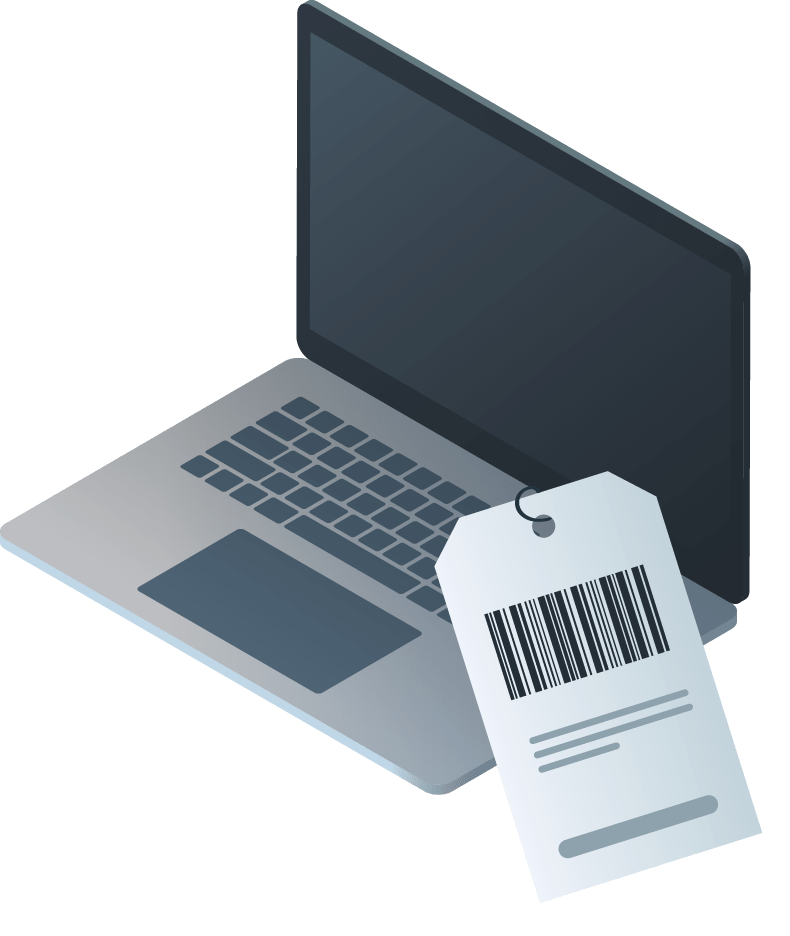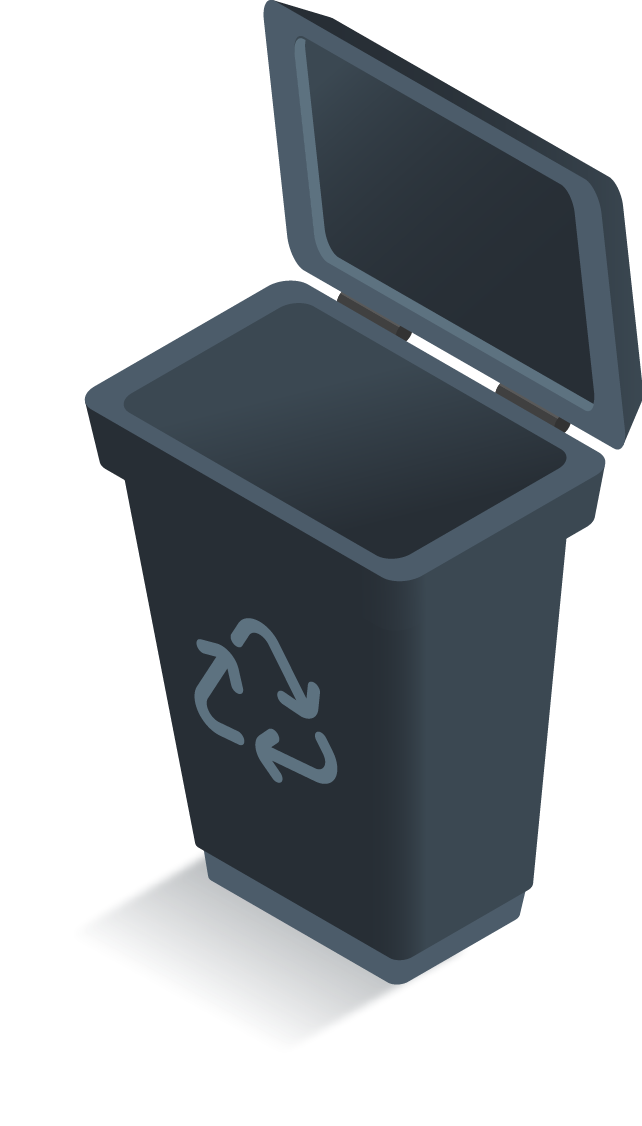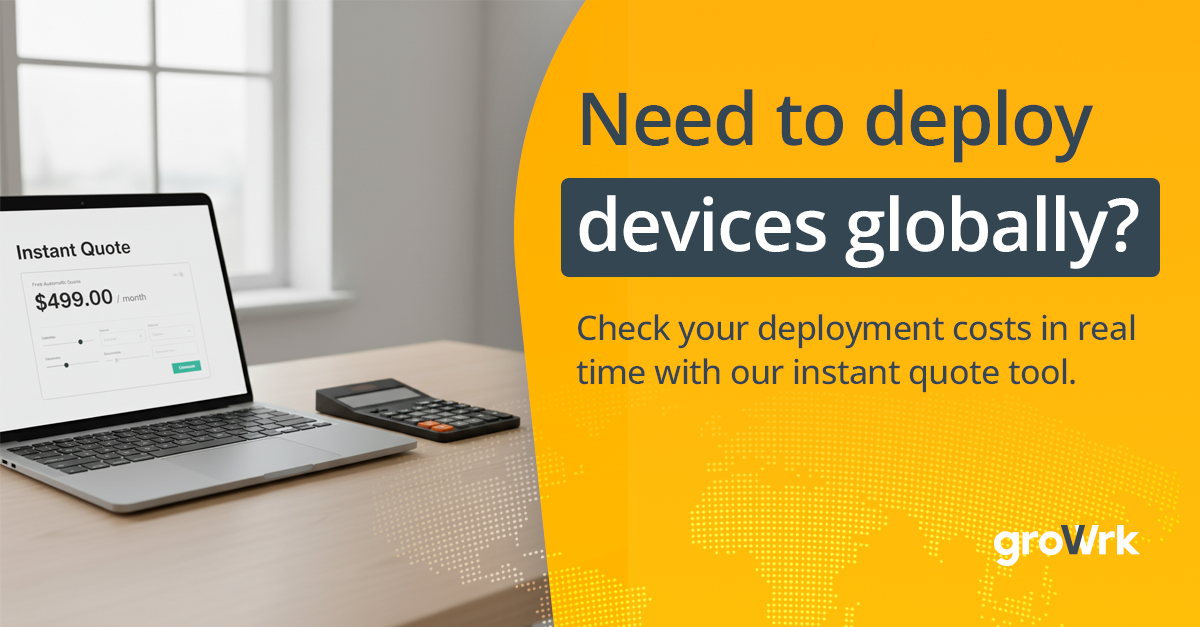How to send IT equipment to France
Are you shipping laptops or IT equipment to teams in France? Managing logistics, customs, and compliance can be complex, but GroWrk makes it effortless. We handle procurement, shipping, and secure deployment, ensuring your IT assets arrive on time, fully compliant, and ready to use. Whether equipping new hires or retrieving devices from departing employees, we streamline the entire process so you can focus on managing your remote workforce.

At a glance
France has become a powerhouse in Europe’s digital landscape, with a thriving tech ecosystem and a rapidly expanding digital economy. As remote work continues to rise, France's growing demand for IT solutions, cloud services, and digital transformation is reshaping how businesses manage their tech resources and assets.
|
CURRENCY Euro (EUR) |
OFFICIAL LANGUAGE French |
TIME ZONE Central European Time (CET) GMT+01:00 (Central European Summer Time (CEST) GMT+02:00 during daylight saving time) |
|
CUSTOMS DUTY ON ELECTRONICS 0-5% + 20% VAT Typically 0-5% customs duties and 20% VAT, with possible reductions for certain categories of goods |
SHIPPING LEAD TIME 3-7 days (depending on location and shipping method) |
IT OUTSOURCING MARKET €10.6 billion €10.6 billion in 2024, expected to grow significantly, with projections indicating it will reach €21.8 billion by 2025 |
Overview of IT operations in France

Digital Economy: The digital sector accounts for nearly 10% of France's GDP, reflecting its importance to the national economy.
Cloud Market Expansion: The French cloud market is expected to grow to €10.7 billion by 2025, indicating strong demand for cloud services.
High Internet Penetration: With 92% internet penetration, France is well-equipped for digital operations, including remote work and e-commerce.
Focus on Innovation: France leads in sectors like AI, cybersecurity, and fintech, attracting global tech investment.
Remote Work Adoption: A surge in hybrid and remote working models has made IT asset management and logistics critical for businesses.
Shipping IT equipment to France: What you need to know
| Customs regulations |
|
| Duties and taxes |
|
| Required documentation |
|
| Import restrictions |
|
| New vs. Used equipment |
| New IT equipment is relatively simple to ship and subject to VAT and customs duties. However, used or refurbished equipment must comply with France’s WEEE (Waste Electrical and Electronic Equipment) regulations, requiring proof of proper recycling or disposal. This ensures that electronic waste is handled appropriately. |
| Sensitive Technology |
Certain technologies like encryption software or surveillance equipment may require special permits or export licenses from French authorities. These items could be subject to strict export controls and may need the French Ministry for the Economy or customs approval. |
| Penalties or fines for non-compliance |
|
Checklist for sending laptops to France
When shipping laptops to France, it’s important to follow a few best practices to ensure the process goes smoothly, and your equipment arrives safely and on time. Here are some helpful shipping tips:

Select trusted couriers: Choose reliable couriers such as GroWrk, DHL, UPS, FedEx, or La Poste (Colissimo, Chronopost) for international shipping. These carriers offer tracking services and have experience handling French customs procedures.
Check service levels: Select the appropriate shipping option based on urgency. Express shipping (2-5 days) for high-priority deliveries. Standard shipping (5-10 days) for cost-effective options.
Use high-quality packaging: Secure laptops with sturdy, padded boxes and protective materials like bubble wrap, foam inserts, or air cushions to prevent damage during transit.
Disassemble where possible: If shipping accessories like chargers, docking stations, or monitors, package them separately to prevent damage. Remove detachable components if applicable.
Label clearly: Ensure the recipient’s name, address, and contact details are correctly labeled. Mark the package as "fragile" to encourage careful handling.
Accurate product descriptions: On the commercial invoice, provide a detailed and accurate description of the laptop, including its brand, model, and serial number. Inaccurate descriptions may cause customs delays.
Value declaration: Declare the correct value of the laptop to avoid under- or over-declaring, which could lead to customs inspections or fines. The declared value determines any applicable duties and taxes.
Customs declarations: Since France is in the EU, shipments from within the EU do not require customs clearance. However, for shipments from outside the EU, include EU Single Administrative Document (SAD), commercial invoice, and packing list.
Proof of origin: If applicable, include a certificate of origin to determine eligibility for preferential trade agreements, which may reduce duties.
Understand import duties & taxes: Laptops are subject to 0% customs duties under the EU tariff classification but are subject to 20% VAT on the declared value.
Pre-pay duties and taxes: Some couriers allow for pre-paid duties and taxes to simplify customs clearance and prevent the recipient from facing unexpected charges upon arrival.
Protect against loss or damage: Consider purchasing shipping insurance for high-value laptops to protect against loss, theft, or damage during transit.
Compliance with French and EU regulations: Ensure compliance with EU electronic safety standards, including CE marking, WEEE (Waste Electrical and Electronic Equipment), and RoHS (Restriction of Hazardous Substances) regulations before shipping.
Use tracking tools: Major couriers provide real-time tracking—monitor shipments closely to anticipate customs clearance updates and delivery progress.
Stay in touch with the recipient: Notify the recipient about the expected delivery timeline, tracking updates, and any customs-related requirements to avoid delays.
Expect weather and seasonal delays: Winter weather and peak shipping periods (e.g., Christmas, Black Friday, French national holidays) may cause delivery delays. Plan shipments accordingly.
French domestic delivery options: For final delivery, consider working with La Poste, Chronopost, Colissimo, or Mondial Relay for efficient last-mile distribution.

Average cost of IT Equipment in France
Laptops (Business Grade):
- Mid-range: €700 - €1,400
- High-end: €1,400 - €2,800
High-end models such as Apple MacBook Pro, Dell XPS, and Lenovo ThinkPad are priced on the higher end.
Monitors (Business Grade):
- Standard: €150 - €350
- Ultrawide/4K: €500 - €1,000
Monitors from trusted brands like Dell, Samsung, and LG typically range within these prices, with 4K or ultrawide models costing more.
Desktops (Business Grade):
- Standard Desktop PC: €450 - €1,500
- Workstation Desktop (for high-performance tasks): €1,500 - €4,000+
Prices depend on the brand and specifications, with options from HP, Lenovo, and Apple among the most common.
Printers (Laser):
- Standard Office Printers: €120 - €350
- High-Volume Printers: €600 - €2,000
Leading brands such as HP, Canon, and Brother offer a wide range of models for office environments.
Public holidays & IT work hours to plan your shipment
Key public holidays in France:
- New Year’s Day (Jour de l'An) – January 1
- Easter Monday (Lundi de Pâques) –Monday after Easter Sunday
- Labour Day (Fête du Travail) – May 1
- Victory in Europe Day (Fête de la Victoire 1945) – May 8
- Ascension Day (L'Ascension) – 40 days after Easter (usually in May)
- Whit Monday (Lundi de Pentecôte) – 50 days after Easter (usually in May or June)
- Bastille Day (Fête Nationale) – July 14
- Assumption of Mary (L'Assomption) – August 15
- All Saints’ Day (La Toussaint) – November 1
- Armistice Day (Jour de l'Armistice) – November 11
- Christmas Day (Noël) – December 25
Typical work hours for IT professionals
- Standard Workweek:
- The legal workweek in France is 35 hours (Monday to Friday), typically from 9:00 AM to 6:00 PM with a one-hour lunch break.
- Some companies may offer flexible hours, especially in the tech industry, allowing employees to adjust their start and end times, but still maintaining the 35-hour workweek.
- Overtime:
- Overtime is usually limited to 10 hours per week, with strict regulations on the number of hours worked beyond the standard 35 hours.
- Overtime is compensated at a rate of 125% for the first 8 hours and 150% for any additional hours worked.
What to consider when retrieving IT equipment from employees in France
| Local delivery and logistics services |
|
| Inventory management |
|
| Logistics challenges for remote locations |
|
| Compliance with French employment laws |
|
How to dispose of IT equipment in France
Adhere to WEEE regulations
The WEEE (Waste Electrical and Electronic Equipment) Directive is a European Union regulation that France follows for the disposal of electrical and electronic devices. The main objective is to reduce e-waste and promote recycling and reuse.
- Registration: Businesses must register with an approved Producer Compliance Scheme to manage the collection, treatment, and recycling of e-waste.
- Collection and Recycling: IT equipment (laptops, monitors, printers, etc.) must be handed over to certified collection centers or recycling organizations that are compliant with WEEE regulations.
Use authorized collection points
To ensure compliance, IT equipment should be disposed of at authorized e-waste collection points, such as:
- Municipal Waste Collection Centers: Many French municipalities have dedicated drop-off points for e-waste. You can find these centers by contacting your local mairie (town hall).
- Retailers and Manufacturers: Many electronics retailers in France (e.g., Fnac, Darty) offer take-back schemes where you can return old equipment when purchasing new items. Some manufacturers also offer disposal services.
Donate or resell equipment
If your IT equipment is still functional, consider donating or reselling it rather than disposing of it.
- Donations: Nonprofits and organizations like Emmaüs or Secours Populaire accept used but functional IT equipment for charitable purposes.
- Reselling: Platforms like Leboncoin or Back Market allow businesses or individuals to resell or refurbish used IT equipment.
Data destruction
Before disposing of or reselling any IT equipment, ensure all sensitive data is securely wiped from the devices.
- Data Wiping: Use specialized software to wipe the hard drive and permanently erase all data.
- Professional Services: If you lack the technical expertise, there are companies that specialize in data destruction and can guarantee that all data is securely erased.
E-waste recycling companies
There are certified companies in France that specialize in e-waste recycling, which ensure proper disposal and recycling in compliance with French and EU regulations. Some prominent e-waste recycling companies in France include:
- Electrocycling: A producer compliance scheme that helps businesses comply with the WEEE directive.
- Veolia: Offers specialized e-waste disposal and recycling services.
- Eco-systèmes: An e-waste management scheme that works with businesses to collect and recycle electronics.

Local IT Outsourcing Solutions in France
You can streamline your IT logistics and asset management with GroWrk’s comprehensive global solution. Whether it’s shipping equipment or managing IT assets across multiple regions, GroWrk helps you stay compliant and efficient, every step of the way. Here’s why GroWrk is the ideal partner for managing your IT assets in France:

| 1. Wide global coverage |
| With operations in over 150 countries, including France, GroWrk ensures fast, efficient IT deployment for remote teams. Whether your employees are in Paris, Lyon, Marseille, or remote locations, we handle everything—so your team stays productive without logistical challenges. |
| 2. End-to-end asset management |
From procurement and deployment to retrieval and disposal, GroWrk simplifies every stage of IT asset management. We take care of logistics, compliance, and security, allowing your team to focus on business growth while we manage IT infrastructure. |
| 3. Intuitive platform for easy deployment |
Our intuitive platform lets you order, ship, and track IT equipment in France with ease. Employees receive pre-configured, ready-to-use devices, reducing administrative overhead and costly delays. |
| 4. Smooth delivery and equipment retrieval |
GroWrk ensures on-time delivery and hassle-free retrieval of IT assets across France. Whether shipping laptops, monitors, or accessories or retrieving devices from departing employees, we make the process seamless and fully traceable. |
| 5. Compliance with French import regulations |
France has strict customs, VAT, and compliance requirements for IT shipments. GroWrk ensures CE marking, WEEE disposal, and tax compliance, preventing delays, penalties, or unexpected costs. |
| 6. Efficient repairs and maintenance |
We manage hardware repairs, replacements, and maintenance to keep your IT assets in top condition. Whether through on-site servicing or remote troubleshooting, GroWrk minimizes downtime and ensures business continuity. |
| 7. 24/7 Support for peace of mind |
From shipping assistance and compliance management to real-time troubleshooting, GroWrk’s 24/7 support ensures smooth IT operations, keeping your remote workforce in France fully equipped. |
Procure, configure, and deploy your IT devices from one platform


